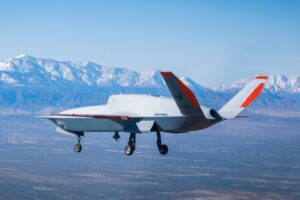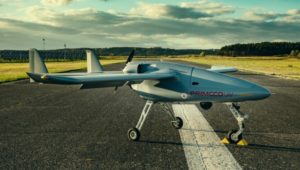Will the Countering CCP Drones Act actually pass? The measure to ban DJI drones in the U.S. has become one of the most talked-about issues in the drone industry. And I wish I knew whether it would actually pass. Alas, I don’t have a crystal ball, so I cannot say what will become of the controversial, anti-DJI legislation. And hey, no one knows.
But here’s what we know so far about the Countering CCP Drones Act — and where it’s headed:
The fate of the Countering CCP Drones Act
Countering CCP Drones Act: a primer
Before we dig into the future of the Countering CCP Drones Act, here’s a quick primer on the proposed legislation. We’ve been covering the Countering CCP Drones Act extensively here at The Drone Girl. But if you’re new here (or have just been MIA over the past few months), here’s the tl;dr:
The Countering CCP Drones Act addresses security concerns surrounding Chinese drone technology. In particular, it targets drones manufactured by DJI, the world’s leading drone maker. Some U.S. politicians have expressed worries about potential data transfer or manipulation by the Chinese government through DJI’s drones.
If passed, it could ban DJI drones by adding DJI to a list of companies deemed threats to national security. Addition on such a list would limit their ability to operate within certain communication spectrums crucial for drone control. Thus, it would make DJI drones about as useable as a paper weight.
The Act ultimately got a ride on the National Defense Authorization Act (NDAA) for Fiscal Year 2025. That massive, annual bill outlines U.S. defense spending, but it also includes a hodgepodge of other semi-related topics, such as consumer drones. By being included in the NDAA, the CCDPA bypassed some standard legislative hurdles and sped up the process.
As discussions and deliberations unfold, the question on everyone’s mind is: What are the chances of the Countering CCP Act passing into law?
It already passed the U.S. House of Representatives
The Countering CCP Drones Act has already passed the House of Representatives. But, the vote was close. The $883.7 billion NDAA FY25 defense bill passed only through what was a tight 217 to 199 vote.
That vote largely fell along party lines, where 196 Democrats opposed the bill. Meanwhile, just six Democrats supported it. On the other hand, 211 Republicans voted in favor, and only three were against it.
It still has to go to the Senate
Though it passed the House of Representatives, it still needs approval by the Senate before reaching the President’s desk.
What’s more, we have a long lead time. In fact, political experts say the Senate vote likely won’t happen until December 2024. It’s also possible that the bill could evolve between now and then anyway. And you should consider that possibility to be quite likely.
“If your students have been paying attention in their Social Studies class, they’ll tell you that these Bills are always packed with superfluous proposals that get trimmed down at every stage of the approval process,” according to a statement from Droneblocks, which is an American drone company based in Austin, Texas that famously builds a $400, DJI alternative drone called the Crazyflie Nano.’
And don’t forget that the period between now and the end of the year is going to be pretty spicy from a political standpoint anyway given the 2024 presidential election.
“Between now and then, there is a hot election season, with many politicians showing a strong front against China,” Droneblocks wrote in a post about the bill. After Election Day…this grandstanding could cool off considerably – though only time will tell.”
It’s surrounded by controversy
Proponents argue that tighter regulations around DJI drones are necessary to safeguard national security and protect intellectual property rights from potential Chinese espionage and coercion.
Beyond security concerns though, key backers of the act have also emphasized the need for a robust response to what they perceive as China’s aggressive pursuit of technological dominance. There’s definitely some Buy American sentiment surrounding the bill. Some supports hope that banning DJI drones would help American drone companies gain a stronger foothold.
On the other hand, critics argue that overly stringent regulations could stifle innovation and disrupt global supply chains. Sure, a DJI ban would affect DJI and potentially other Chinese drone companies but also American businesses that rely on DJI drones. And there are many. No shortage of businesses — from small wedding photography operations to major oil and gas companies like Shell — rely on DJI.
It could also kill the world of drone flying for hobby pilots and casual photographers, who have generally flocked to DJI products for not just their affordability, but also their ease of use, proven track record for safety and quality.
It’s incited all sorts of Change.org petitions, angry Reddit threads, and formal letters to politicians.
Other proposed laws could provide a more likely alternative
Perhaps in anticipation of the pushback, we’ve already seen alternative pieces of legislation. Many of these proposals take a more moderate approach to hampering DJI’s growth — without an outright ban.
The DFR Act
One notable proposal, the Drones First Responders Act, would create a 30% tariff on drones made in China. Once imposed, the Act would hike tariffs by 5% annually. And come 2030, the DFR Act would outright ban the importation of drones that contain certain, critical components made in China. Perhaps not coincidentally, Elise Stefanik (one of the authors of the Countering CCP Drones Act) also authored the DFR Act.
Sure, even the DFR Act has its fair share of critics. Tariffs are often criticized as an inconsistent revenue stream. After all, they can end up raising costs to a point that significantly (and negatively) impacts small businesses and individuals.
The DFR Act wouldn’t so much address fears around DJI drones ‘spying’ on America, as much as it would potentially cut back on the number of pilots choosing to fly DJI. It could compel pilots to turn to American drone companies for their next aircraft. But it’s not a guarantee — particularly if prices for American drones don’t go down.
The American Security Drone Act of 2023
There’s also the American Security Drone Act of 2023. That act which would specifically prohibit federal agencies from purchasing drones made by Chinese government-linked countries. This act has perhaps the most likelihood of passing, as it addresses concerns of China’s government gaining access to U.S. government data. But, it wouldn’t necessarily block or increase costs for small businesses, consumers or other entities seeking to use DJI drones.
And, by forcing federal agencies to buy from non-Chinese drone companies, it could perhaps give a leg up to American drone companies. That would solve political goals to incite growth among U.S.-based companies.
What other anti-China legislation shows us about efforts to ban DJI drones
Efforts to legislate DJI are yet another example of a broader trend in U.S. policy towards mitigating perceived risks associated with Chinese technological dominance. For example, the push to ban TikTok demonstrated concerns over data privacy and national security. Similarly, the Countering CCP Drones Act reflects parallel anxieties about potential vulnerabilities in critical infrastructure and data security posed by DJI.
As for the fate of the Countering CCP Act? It hinges on several factors, including ongoing geopolitical tensions, economic considerations, and domestic political dynamics. While there is widespread agreement on the need to address China’s technological influence, the specifics of how to achieve this balance remain contentious.
So will the Countering CCP Drones Act actually pass?
No one knows, but it’s far from guaranteed to pass.
“The DJI drone legislation has an uphill battle,” said Jonathon Molik, a U.S. intelligence officer with nearly three decades of experience. Molik, who said he is in favor of legislation to block DJI given its ties to China and data collection said he thinks a ban is unlikely.
Going back to the TikTok comparison, Molik said that — because drones just aren’t as widespread as TikTok — the fear of Chinese espionage may also not be quite as widespread.
“Although drones have become more popular, the general public doesn’t have a connection to drones like it does TikTok,” he said. “This means the general fear of what can happen by using DJI drones just doesn’t register.”
The post Will the Countering CCP Drones Act actually pass? appeared first on The Drone Girl.





